 Petzlover
PetzloverBullenbeisser is originated from Germany but Dandie Dinmont Terrier is originated from United Kingdom. Bullenbeisser may grow 36 cm / 15 inches higher than Dandie Dinmont Terrier. Bullenbeisser may weigh 23 kg / 51 pounds more than Dandie Dinmont Terrier. Bullenbeisser may live 3 years less than Dandie Dinmont Terrier. Bullenbeisser may have more litter size than Dandie Dinmont Terrier. Bullenbeisser requires Low Maintenance. But Dandie Dinmont Terrier requires Moderate Maintenance
Known also as the German Bulldog, the Bullenbeisser was a strong dog which is now unfortunately extinct. There were two regional types – the Brabanter- and the Danziger Bullenbeisser.This Molosser-type dog was native to Germany and was bred for different hunting purposes.
Nobody is quite sure what dogs are included in Molossers, but they are essentially large dogs bred to hunting and rescue, tending to have a shorter muzzle. The Bullenbeisser is famous for the role the dog has played in the development of the wonderful dog we have today, the Boxer. In fact, some Bullenbeissers were crossed by the Boxer Kennel Club of Germany with Bulldogs from the UK.
Not much is known about the history of the Bullenbeisser, but the breed also has a history in the lands of the Holy Roman Empire. The dog was at first a type of Mastiff, large and with the typical brachycephalic head, and used for hunting because of their power.
To improve their dogs, many Bullenbeisser breeders began crossing their dogs with English Bulldogs, introducing a white coat to the Bullenbeisser. Other breeds were also crossed with the dog such as the Bull Terrier, but by the end of the 19th century, the traditional Bullenbeisser was slowly dying out. It was in the late 1870s that German breeders, Hopner, Konig and Roberth used the dog to bring about a new breed, which today is known as the Boxer.
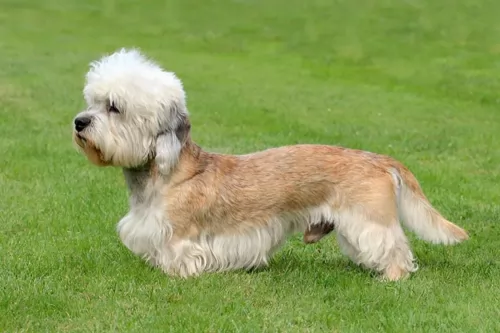 The rough coated Dandie Dinmont Terrier originates from Scotland. They were used centuries ago for hunting otters and badgers.
The rough coated Dandie Dinmont Terrier originates from Scotland. They were used centuries ago for hunting otters and badgers.
There are theories that exist that the dog is a cross between Scottish- and Skye Terriers while others believe there must be some Dachshund in the mix because of the long body of the Dandie Dinmont Terrier.
The Dandie Dinmont Terrier was first recorded as a distinct breed in the late 1600s. The British Dandie Dinmont Terrier Club was formed in 1875 while the American Kennel Club recognized the Dandie in 1886.
The Boxers lineage comes from the Bullenbeisser. The Bullenbeisser was a fierce, courageous dog, noted for its hunting abilities. The dog was developed into the Boxer so that its body become more defined and more streamlined.
Described as a medium to large muscular dog, standing roughly 63cm in height, he would have weighed in the region of 32kg. He had a short coat, brown eyes and short to medium ears which were half erect, half floppy.
Brown to fawn in color, he had a long tail which was later docked to give the dog a more distinctive, attractive look. The dog also got its attractive fawn color from the English Bulldog. Loyal, active and loving, the Bullenbeisser was a true family dog with a close affinity to children.
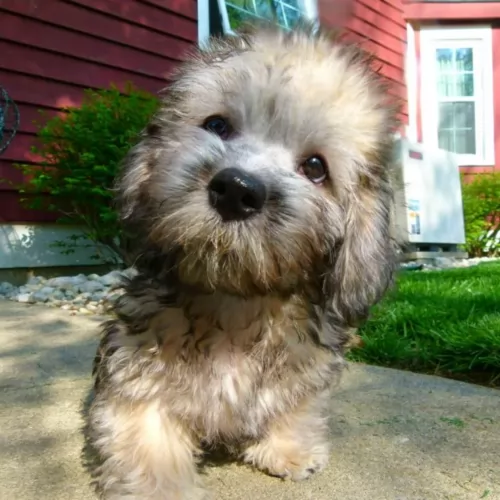 The Dandie Dinmont Terrier is a small dog who stands between 20 – 28cm at the withers and weighs between 8 and 11kg. He is recognizable by his fluffy head of hair.
The Dandie Dinmont Terrier is a small dog who stands between 20 – 28cm at the withers and weighs between 8 and 11kg. He is recognizable by his fluffy head of hair.
He actually has quite a unique look with his long body and slightly over-sized head. He has floppy ears and a long tail. His coat is quite unusual too in that it can be silky and long around the face, legs and belly, while the topcoat is fairly shortish and crisp. His coat color is fawn to brown or reddish. He isn’t a heavy shedder.
Known also as the Dandie, Charlie’s Hope Terrier, the Mustard and Pepper Terrier, the Dandie Dinmont makes an excellent family pet with his calm demeanor, being somewhat reserved around strangers.
He is an alert, intelligent little dog and will warn you of strangers coming into your space. He therefore makes a good watchdog. He is loving and loyal to his human family and will readily fit into life in the city or in the countryside.
They are good with children and pets but with his independent streak, he will require training and socialization if you want him to behave and be obedient.
Information on the extinct Bullenbeisser is limited, but because he was used to bring about the Boxer you can be sure that he would have been fearless, courageous and territorial of his property and of his human family.
The Bullenbeisser would have been a good watch-dog and with the right kind of loving care, a most awesome and loving family companion.
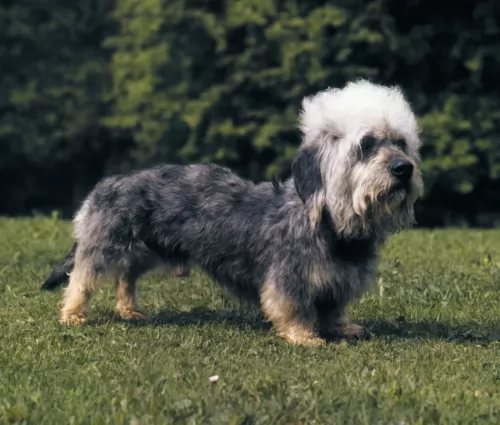 Your Dandie Dinmont is capable of being a wonderful companion. He loves spending time with his human family and is affectionate and loyal.
Your Dandie Dinmont is capable of being a wonderful companion. He loves spending time with his human family and is affectionate and loyal.
The small Dandie is able to fit into life in the city or country, just so long as he has his human family with him. Because he comes from Terrier dogs, he is no push-over though and he has an independent streak which will benefit from training and socialization.
Make sure you give this small dog of yours plenty of love and good care and you will find that you have a loyal, devoted friend in him.
In general, medium to large breeds like the Bullenbeisser have a lifespan of 10, 11 or 12 years. The life expectancy of these dogs relied much on the lifestyle they led and their diets.
The Bullenbeisser had a deep chest and this made dogs like this prone to gastric dilatation and bloat which can be life-threatening and which requires immediate veterinary intervention. The dog with this disease has distension of the abdomen and extreme discomfort, wanting to vomit but being unable to do so.
Hip Dysplasia is a disease which is more common in larger dogs and is an abnormal formation of the hip socket, resulting in lameness accompanied by painful arthritis.
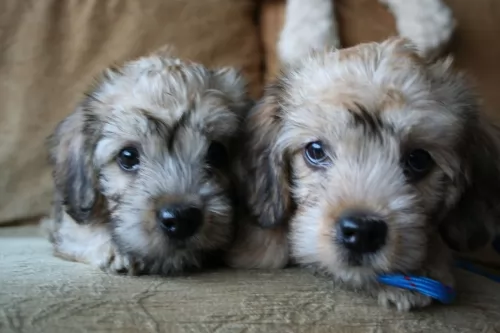 Your pet Dandie Dinmont is a robust little dog who, with good care, can live to be anything between 12 to 15 years of age.
Your pet Dandie Dinmont is a robust little dog who, with good care, can live to be anything between 12 to 15 years of age.
With every dog breed there will be health concerns, and these can include illnesses such as epilepsy as well as hypochondroplasia. All dogs have the potential to fall prey to health problems, and getting your pet from a reputable breeder can help to ensure you eliminate some of these diseases.
This small dog has a long body which means he can be affected by spinal problems. Genetics and body shape play a large role. Intervertebral disc disease is a condition where the cushioning discs between the vertebrae of the spinal column herniate into the spinal cord space. The discs press on the nerves and pain and paralysis can follow.
The Bullenbeisser was a mastiff like breed with a short, easy-to-care for coat. He would have required a good brushing down at least twice a week to remove the coat from loose hairs. As an active, outdoor-type dog, he would have had to have his ears checked for dirt and the possibility of infection.
Although the Bullenbeisser was a hunting dog, he no doubt led an active outdoor lifestyle. Dogs such as the Boxer and the Mastiff, which are descendants of this dog are the kind of dogs which will need to be exercised regularly, taken on walks and given lots of running games with a ball.
As a medium to larger breed with lots of energy, the Bullenbeisser would have no doubt had home-made food from his master’s table. This food would have included meat and vegetables. As a hunting dog he would have had the chance to get in some raw meat which is imperative for the health of any domesticated dog today.
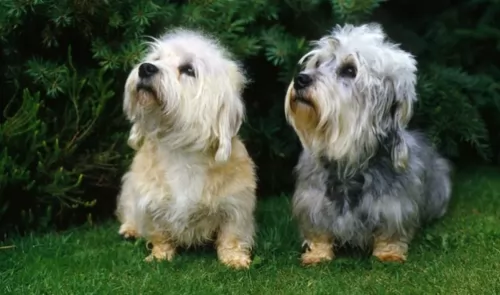 The Dandie doesn’t require as much exercise as some other dog breeds but you want to make sure he goes with you on your walks, or you play ball with him in the garden. You don’t want to see a small dog like this becoming obese as it can herald in a host of health problems.
The Dandie doesn’t require as much exercise as some other dog breeds but you want to make sure he goes with you on your walks, or you play ball with him in the garden. You don’t want to see a small dog like this becoming obese as it can herald in a host of health problems.
The Dandie Dinmont Terrier doesn’t shed a hang of a lot but still, you will need to brush him twice a week to get rid of those loose hairs. Also, the coat will require stripping twice a year. Some dog owners who prefer a low maintenance breed might not like knowing this, but it is a necessary part of his grooming. There are some dog owners who cut the hair rather, but then the texture of the coat will change. This is only important to know if you want to show your Dandie. Other Dandie owners take their pets to a professional groomer for clipping.
Because the Dandie has floppy ears and a lot of hair around the face and ears, you will need to check his ears for dirt and wax build-up as these can cause an ear infection. If you’re nervous to be going inside your dog’s ears, the vet or the dog groomer can show you how.
Also, little dogs like this are prone to tooth decay, and you will need to brush his teeth 2 or 3 times a week. This is because plaque and tartar buildup can cause mouth infections which contribute to other diseases within the body.